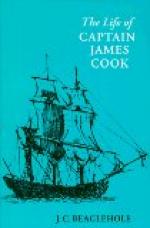He also notifies at the same time that the appointments made have all been confirmed.
Cook himself was appointed Commander of the Scorpion on 29th August, but owing to other arrangements being made did not put in an appearance on his new ship. Isaac Smith and Isaac Manly were appointed respectively Master’s mate and midshipman, taking part in the Second Voyage, being too young for further promotion.
The newspapers, of course, blossomed out into paragraphs on the subject of the voyage, more or less correct, and Bingley’s Journal on 23rd July stated:
“In consequence of this discovery, more ships will be destined in search of this new terrestrial acquisition.”
Evidently it was quickly decided that Cook’s rest was to be short. On 27th the same Journal says:
“His Majesty’s Ship, the Endeavour, which is lately arrived in the River from the East Indies, lost by the unhealthiness of the climate, 70 of her hands, tho’ they were picked men, and had been several times in the Indies. However, those who survive will have made their fortunes by traffic, having brought home some of the richest goods made in the east, which they are suffered to dispose of without the inspection of the Custom House officers. This, our correspondent says, is allowed them by the Government as a reward for their hard and dangerous service during a voyage of three years.”
The amount of the “richest goods made in the East” obtained from New Zealand, Australia, and Otaheite would be but a poor reward for three years’ strenuous service; and Cook here finds his premonition as to his losses being exaggerated, only too true.
It is worthy of note that the number of punishments throughout the voyage was remarkably small, those entered in the ship’s log being twenty-one, and the heaviest sentence, two dozen lashes for theft. In one case, that of Mathew Cox, A.B., for disobedience and mutinous conduct, the culprit proceeded civilly against Cook, on arrival in England, and the Admiralty solicitors were instructed to defend. The case was probably allowed to drop, as no result can be found.
Last of the endeavour.
The good ship which had so bravely borne her part, was not given much rest; but after being paid off at Woolwich, was despatched, under lieutenant James Gordon, to the Falkland Islands on 16th October, and returned with “perishable and unserviceable” stores; in 1772 and 1773 she again made voyages to the same destination, the last one to bring away the garrison and stores, as those islands were to be handed over to Spain. She was paid off at Woolwich in September 1774, and shortly afterwards was sold out of the Navy for the sum of 645 pounds. She is then believed to have been employed as a collier in the North Seas. Mr. Gibbs, of the firm of Gibbs and Canning of Newport, Rhode Island, one day pointed out to the English Consul the remains of an old vessel




